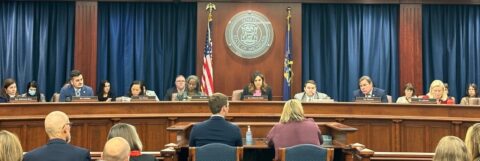Good afternoon, I am Meghan Schmidbauer, Senior Director of Detroit Drives Degrees at the Detroit Regional Chamber. Detroit Drives Degrees is the collective impact initiative that brings stakeholders together to increase access and degree attainment to strengthen the talent pipeline in Southeast Michigan. In 2016, we adopted our 2030 goals of increasing degree and quality credential attainment to 60% and reducing the racial equity degree attainment gap. Before joining D3, I spent 10 years working in higher education.
I am here today to vocalize our support for Senate Bill 463, which includes FAFSA completion as a high school graduation requirement.
FAFSA is an enrollment predictor.
FAFSA completion and college enrollment are related. Students who complete the FAFSA are 85% more likely to enroll in a postsecondary education program. Students in the lowest socioeconomic quintile were associated with a 127% increase in college enrollment after high school graduation.
Students and families do not complete the FAFSA not because they do not feel it is important but because of misinformation.
Preconceived notions and rumors about the FAFSA contribute to students’ misinformation about the process and the reasons behind the application. Lower-income students report they did not know they could complete one, did not know how to complete it, or believed they were ineligible due to thinking creditworthiness, not being able to attend college full-time, or their high school academics disqualified them from completing the FAFSA.
Universal FAFSA would benefit all students, especially students of color and economically disadvantaged students.
Michigan would not be the first state to adopt this requirement. Louisiana adopted FAFSA as a graduation requirement starting in the 2017-2018 school year. In 2022, they had a 74% FAFSA completion rate, with the most significant gains in students of color. From 2020 to 2022, completion rates increased for black students by 9%, Hispanic students by 12%, multi-race students by 10%, and all economically disadvantaged students in Louisiana increased by 9%.
According to the latest American Community Survey, of the 15 largest metro areas in the United States, Detroit has the highest percentage of the population aged 5-17, living below the poverty level at 20.4%. Knowing this, we can lift this opportunity as another way to increase access and equity across the state.
FAFSA unlocks federal, state, and institution-based aid.
Just a few months ago, a transformative education budget was signed, allocating $24.3 billion. The Michigan Achievement Scholarship was designed to remove as many financial barriers as possible for students, making a college education more achievable than ever before. However, students must complete the FAFSA to unlock this scholarship opportunity, Pell Grant dollars, and institution-based aid.
Unfortunately, Michigan’s graduating classes of 2021 and 2022 left $182.6 Students did not know what was available to them.
The burden is not on a singular group in the states with this requirement.
Supporting students and families is not the sole responsibility of high school counselors or districts. We at the Chamber are willing to work within the community to increase the knowledge about the power of this opportunity. The FAFSA will open again in December with significantly fewer questions and a more streamlined process for families to import income data from tax records.
Michigan has an opportunity to be a leader in removing barriers for all students.
As more states adopt similar policies, we can be among the first few to signal that we recognize the importance of education and investing in our citizens. This is not a silver bullet and will require accompanying strategies to ensure success; however, we must focus on increasing FAFSA knowledge and completion to ensure students receive the information and opportunities they deserve.
On behalf of Detroit Drives Degrees and the Detroit Regional Chamber, we ask you to vote yes on Senate Bill 463.


